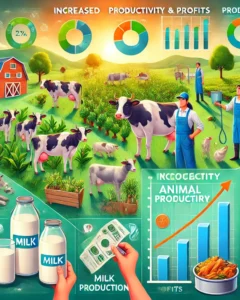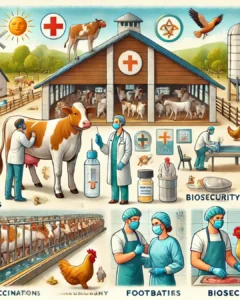In modern farming, animal husbandry in India is one of the most crucial segments. This is the skill and knowledge of breeding livestock. Look at it this way – it is a division of farming that is less strenuous but has much more returns for the farmers. But how is it done?
In this article, we will focus on how good animal husbandry practices benefit farmers in India when put into practice. Additionally, we look at the impact, importance, and simply the advantages of animal husbandry practices in day-to-day agricultural life.
What Are Good Animal Husbandry Practices In India?
Good animal husbandry practices go beyond just breeding and involve steps that ensure the well-being of the cattle. You have just heard that a happy cow gives more milk! And this is the essence of good animal husbandry practices. It has been proven compensation practices work.
Everything from your livestock’s health to their nutritional needs to overall welfare and productivity must be taken care of. Timely feeding, health checkups from the vet, proper shelter management, hygiene maintenance, and breeding arrangements are a few strategies that farmers need to ensure and follow.
Benefits of good animal husbandry practices
Increased Productivity and Profits

Animals tend to be more productive when they receive proper care and follow good animal husbandry practices. These practices lead to improved reproduction rates, increased milk and meat production, and enhanced overall reproduction. Efforts invested in any process always yield better results. For Example:
- Adequately balanced diet: A good and wholesome diet vastly increases animal productivity.
- Regular medical checkups: Regular veterinary checkups can help avoid livestock losses due to animal diseases.
When these norms are adhered to, productivity and usefulness from livestock can be effectively improved, which minimizes costs and reduces livestock losses for farmers.
Lessons Outbreaks of Diseases

When it comes to livestock management, preventing diseases is of paramount importance. Fewer diseases can occur due to vaccination, periodic health examinations of animals, and maintaining hygiene in their settlement. Preserving the health of these animals can also help save farmers from incurring huge losses. Good animal husbandry practices are undoubtedly beneficial to farmers in terms of maintaining diseases.
Therefore, the answer to the question is that farmers can suffer less on an unanticipated burden by profoundly practising good animal husbandry and, in return, enjoy the benefits of having a more stable farming business and source of income.
logical Improvements in Animal Products
The level of care provided and the feeding of the animals determines the quality of animal products like meat, milk, and eggs. This can be expected from good animal husbandry:
- Unadulterated and fresh milk with no additives.
- Soft and healthy meat.
- Well-nourished and healthy eggs.
These value-added animal products can have higher prices in the market. Therefore, farmers can benefit more from these organic and healthy products.
Also Read: Dry Land Farming: A Guide to Resilience and Sustainability
Better Resource Management
Good resource management undoubtedly increases efficiency in most animal husbandry practices. For example, grazing sometimes leads to soil degradation, which pushes farmers to use a planned grazing pattern for their livestock, thus avoiding overgrazing and soil degradation. Additionally, using animal waste and manure as a natural fertilizer can help regain the soil’s fertility.
By integrating resource management strategies with animal husbandry, farmers stand to cut down on some expenses while improving the state of the environment.
Improved Animal Welfare
Healthier animals are happier animals. As such, proper provision of shelter, food of balanced rations, and other human treatment to livestock increases their productivity. Farmers willing to do ethical and humane farming techniques nowadays have consumers who appreciate their efforts, expanding market opportunities today.
Sustainability and Environmental Benefits
And how does good animal husbandry relate to sustainability in a positive way for the farmer? Farmers can lessen their environmental impact by adopting practices like rotational grazing or recycling waste, as well as conserving water. These practices aid in the sustainability of farming practices and help achieve a healthier ecological balance.
How Animal Husbandry Practices Benefit Farmers Economically?
Cost Saving Benefits
Proper feeding and boosters are more effective methods than expensive treatments. Moreover, environmentally friendly approaches like animal waste fertilization reduce crop production costs.
Various Income Sources
Farmers can expand their range of income through animal husbandry with;
- Poultry farming, which yields eggs.
- Dairy farming which involves the sale of milk.
- Selling young livestock from breeding programs.
Capturing Market Advantages
The general population is shifting their preferences towards ethically sourced or organic products. Farmers that practice good animal husbandry can produce at premium prices due to their ability to cater to this need.
Social and Community Benefits
Practicing good animal husbandry not only allows individuals to gain advantages but also improves the welfare of the farming community. Children have food security with healthy livestock, ensuring stable dairy, meat and egg supply.
Challenging other farmers to practice better methods encourages more responsible farming that benefits the entire region.
How Can Animal Husbandry Be Helpful For Farmers Even Under The Most Extreme Conditions?
Adapting to Climate Change Consequences
Animal husbandry practices when done well, allow farms to withstand climate-related issues. For example, water management techniques make it possible to adequately hydrate animals during dry spells.
Shelter construction is done in a way that protects the animals from harsh climates.
These interventions protect both cattle and means of earning income under uncertain circumstances.
Flexibility in the Economy
The farming community, through agriculture animal husbandry, are able to mitigate risks resulting from poor market conditions. For instance, if the economy is doing poorly and crop prices fall, the revenue from livestock will stabilize the farmer’s finances.
Problems Facing The Adoption Of Good Animal Husbandry Techniques
After identifying the benefits, the remaining question is why some farmers have difficulties taking on these practices. Limited resources including access to relevant information and financial resources often form the bottlenecks. This is why governments, NGOs and agricultural extension services are crucial in offering training, subsidies and assistance to fill these gaps.
Conclusion
How exactly do good animal husbandry practices in India help farmers? Economically, environmentally, and socially, the benefits agriculture offers are nearly limitless. From increasing production to making sure the resources are usable and available in the future, the benefits are numerous. While extracting these benefits, the practicing farmers not only earn their living but also aspire to achieve global food security and environmental protection.
The importance of good animal husbandry goes beyond the welfare of the animals. It encompasses the creation of a sustainable and thriving future for farmers and their communities.
Also, Read: Commercial Farming: Feeding the World Through Modern Agriculture



